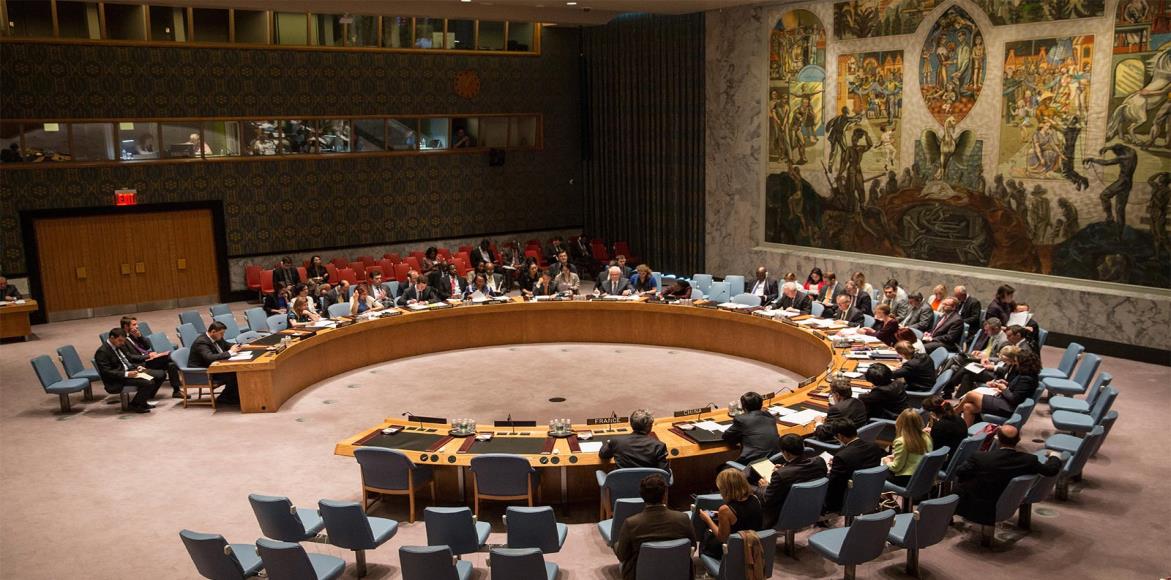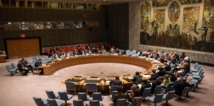The attempts to revive a probe that was disbanded last year come days after at least 43 people were killed in an attack on Douma, the last rebel-held suburb of the capital Damascus.
Russia accused the US, France and Britain of putting forward the text knowing Moscow would not agree so they could use the veto as a pretext for military action.
Russian ambassador to the UN Vassily Nebenzia asked the US to "refrain from the plans that you’re currently developing for Syria" after the third failed vote.
Nikki Haley, the US ambassador to the UN, said Russia’s proposals were designed to give them veto power over the findings and staff of an independent investigation and thus protect Syrian leader and Russian ally Bashar al Assad.
US President Donald Trump cancelled his first trip to Latin America to focus on his country's response, which he has warned would be imminent.
French President Emmanuel Macron said he was consulting with the US and Britain and would announce a decision on a military response within days.
At the invitation of Syria and Russia, investigators from the Organization for the Prohibition of Chemical Weapons (OPCW) were en route to Douma on Tuesday to collect evidence of whether there was a chemical attack.
The watchdog said it has been analyzing information since the first reports of the alleged use of chemical weapons in the April 7 attack.
It is only responsible for determining whether chemical weapons were used - not who used them.
The Syrian and Russian moves to involve the OPCW came hours after Trump described Saturday's attack in Douma as "atrocious" and warned of "some major decisions over the next 24 to 48 hours."
Earlier, a French government spokesman would not be drawn on a timeline for any possible response, but said Trump and Macron had agreed to speak again within 48 hours.
"Once again, it's once the facts are established," Benjamin Griveaux said. "I cannot tell you today if it's a matter of hours or days."
Macron has repeatedly said that the use of chemical weapons in Syria is a "red line" that would trigger reprisals.
British Prime Minister Theresa May said she would be speaking to Macron and Trump on Tuesday.
NATO Secretary General Jens Stoltenberg condemned the use of chemical weapons in the strongest terms.
"This was a horrendous attack, which killed dozens of people, including many children.
It took place in an area where the Syrian regime operates.
It is an area where Syria and its allies Russia and Iran are denying access to international monitors," Stoltenberg added.
Meanwhile, pro-government forces were on alert across Syria and had evacuated some of their posts in anticipation of possible foreign strikes, according to the Syrian Observatory for Human Rights, a war monitor.
Syria agreed to give up its chemical weapons in a Russian-brokered deal in 2013, after hundreds of people were killed in a poison gas attack on rebel-held Damascus suburbs.
However, there have been repeated allegations of government chemical attacks since then, including the April 2017 sarin gas attack on the rebel-held town of Khan Sheikhoun.
Days after that attack, the US launched dozens of missiles on Shayrat airbase in central Syria in response.
Russia at the time called for an OPCW investigation, but then rejected the report of the joint UN-OPCW panel that blamed the government, and later used its veto to prevent the panel's mandate being extended beyond November.
--------------------------------------------------------------------------------------------------------------------
Russia accused the US, France and Britain of putting forward the text knowing Moscow would not agree so they could use the veto as a pretext for military action.
Russian ambassador to the UN Vassily Nebenzia asked the US to "refrain from the plans that you’re currently developing for Syria" after the third failed vote.
Nikki Haley, the US ambassador to the UN, said Russia’s proposals were designed to give them veto power over the findings and staff of an independent investigation and thus protect Syrian leader and Russian ally Bashar al Assad.
US President Donald Trump cancelled his first trip to Latin America to focus on his country's response, which he has warned would be imminent.
French President Emmanuel Macron said he was consulting with the US and Britain and would announce a decision on a military response within days.
At the invitation of Syria and Russia, investigators from the Organization for the Prohibition of Chemical Weapons (OPCW) were en route to Douma on Tuesday to collect evidence of whether there was a chemical attack.
The watchdog said it has been analyzing information since the first reports of the alleged use of chemical weapons in the April 7 attack.
It is only responsible for determining whether chemical weapons were used - not who used them.
The Syrian and Russian moves to involve the OPCW came hours after Trump described Saturday's attack in Douma as "atrocious" and warned of "some major decisions over the next 24 to 48 hours."
Earlier, a French government spokesman would not be drawn on a timeline for any possible response, but said Trump and Macron had agreed to speak again within 48 hours.
"Once again, it's once the facts are established," Benjamin Griveaux said. "I cannot tell you today if it's a matter of hours or days."
Macron has repeatedly said that the use of chemical weapons in Syria is a "red line" that would trigger reprisals.
British Prime Minister Theresa May said she would be speaking to Macron and Trump on Tuesday.
NATO Secretary General Jens Stoltenberg condemned the use of chemical weapons in the strongest terms.
"This was a horrendous attack, which killed dozens of people, including many children.
It took place in an area where the Syrian regime operates.
It is an area where Syria and its allies Russia and Iran are denying access to international monitors," Stoltenberg added.
Meanwhile, pro-government forces were on alert across Syria and had evacuated some of their posts in anticipation of possible foreign strikes, according to the Syrian Observatory for Human Rights, a war monitor.
Syria agreed to give up its chemical weapons in a Russian-brokered deal in 2013, after hundreds of people were killed in a poison gas attack on rebel-held Damascus suburbs.
However, there have been repeated allegations of government chemical attacks since then, including the April 2017 sarin gas attack on the rebel-held town of Khan Sheikhoun.
Days after that attack, the US launched dozens of missiles on Shayrat airbase in central Syria in response.
Russia at the time called for an OPCW investigation, but then rejected the report of the joint UN-OPCW panel that blamed the government, and later used its veto to prevent the panel's mandate being extended beyond November.
--------------------------------------------------------------------------------------------------------------------









 Home
Home Politics
Politics











